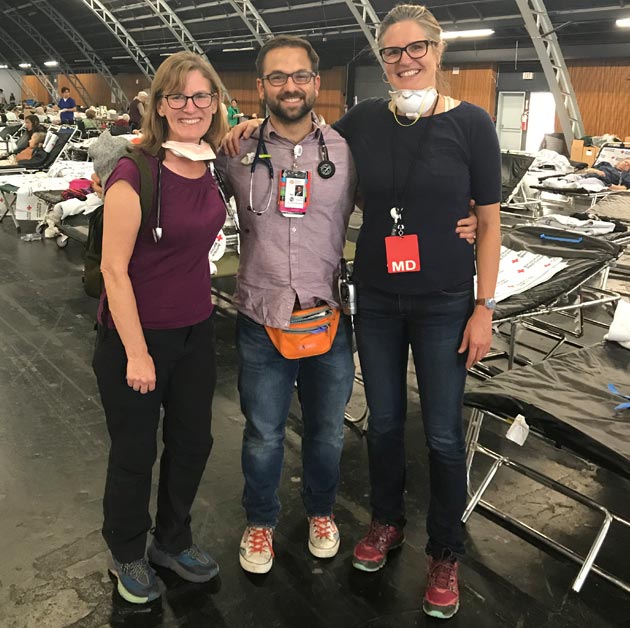For Residency Programs
 Medical residency programs face an array of problems when disaster impacts their training. Faculty and residents can be deployed to help with care in the evacuation centers however it is important to give traumatized residents options to do self care or alternative educational experiences. One option is to assign online modules in disaster medicine. There are several suggestions for online curriculum at the end of this section. If faculty are volunteering in evacuation centers, residents can join them as an alternative to online curriculum.
Medical residency programs face an array of problems when disaster impacts their training. Faculty and residents can be deployed to help with care in the evacuation centers however it is important to give traumatized residents options to do self care or alternative educational experiences. One option is to assign online modules in disaster medicine. There are several suggestions for online curriculum at the end of this section. If faculty are volunteering in evacuation centers, residents can join them as an alternative to online curriculum.
In the setting of disaster, the ACGME reminds us of its institutional policy:
Institutional Requirements IV.M., IV.M.1. states:
The Sponsoring Institution must maintain a policy consistent with ACGME Policies and Procedures that addresses administrative support for each of its ACGME-accredited programs and residents/fellows in the event of a disaster or interruption in patient care. (Core) This policy should include information about assistance for continuation of salary, benefits, and resident/fellow assignments. (Core)
They also note that while there is a specific policy for extraordinary circumstances, 21.00 ACGME Policy and Procedures to Address Extraordinary Circumstances, this is rarely used in natural disasters. More commonly there is an "informal check in:"
Here is a sample "check in" letter to the ACGME. Download Sample Letter
Since Santa Rosa has been through 2 disasters in the last 3 years, our program has several learnings from the experience:
You may not have access to electronic communication. Make sure you have all resident and staff contact info and addresses printed out and held by multiple people.
People respond differently to disaster. Some want to jump in and volunteer, others want to get to a safe place with family and loved ones. Be sure to allow for a variety of responses by residents.
Coming together physically and bonding is key. Residents may have just moved to the area. It is essential to maintain the residency community by bringing people together to eat and talk early and often.
Email is the most unreliable communication method during disaster. Consider using a web based tool such as Slack or GroupMe for residency wide communication. This needs to be established prior to the disaster.
Some resources for online curriculum
Sonoma County Public Health Preparedness Training Website
Virginia Department of Health Medical Reserve Corps Train Online - Free classes and good orientation to Incident Command Systems (ICS) and much more. Website
Disaster Medicine: Recommended Curriculum Guidelines for Family Medicine Residents - American Academy of Family Physicians (AAFP) curriculum and bibliography View PDF
Public Health and Psychosocial Issues of Natural Disasters - Good training by the Austrailian College of Rural and Remote Medicine, however it is not free. Website
Annals of Family Medicine On Coming Home After the Fires. Download PDF
